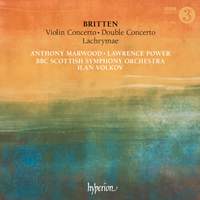Recording of the Week,
Britten Violin Concerto
The Britten Violin Concerto is undoubtedly one of the most unknown and under-rated of all the major violin concertos. I first got to know it about ten years ago when Maxim Vengerov released a recording of the work under the late, great Mstislav Rostropovich. Since then other violinists including Daniel Hope and Janine Jansen have also made excellent recordings, but it still seems very infrequently programmed in concert, and neither can I understand why top violinists like Heifetz and Perlman ignored it throughout the twentieth century.

The opportunity to feature it this week comes thanks to a new recording on Hyperion from Anthony Marwood and the BBC Scottish Symphony Orchestra under Ilan Volkov. Marwood spent sixteen years as part of the Florestan Trio performing and recording all the major repertoire for piano trio. Over recent years he has started to take on more solo and concerto work (including the Thomas Adès concerto “Concentric Paths” which was written for him in 2005), and now that the Florestan Trio have disbanded I think we’ll see and hear even more of him in this capacity.
Britten completed his Concerto a few days after World War II broke out in the summer of 1939. He had recently moved to America with his lifelong partner Peter Pears where they remained until 1942. Britten was a known pacifist and it is possible to hear the concerto as the orchestra (with its sometimes violent and incessant rhythms) representing the growing international tension of the time, while the violin sings serenely above it all, but ultimately in lamentation.
It is a very moving piece, full of tension, which leaves the listener emotionally quite drained by the end. The whole work, and the second movement in particular, shows a strong debt to Prokofiev, whose First Violin Concerto (written twenty years earlier) follows a very similar structural pattern, with the very fast scherzo in the middle.
Marwood plays with a rich and singing tone, making light of the technical difficulties and with just enough vulnerability in the sound for the coda at the end of the Passacaglia last movement. The orchestra perform the difficult second movement with impressive precision and together with Marwood and conductor Ilan Volkov this is a tremendously committed and touching performance.
Anthony Marwood isn’t yet a world-renowned concerto soloist but this new recording is definitely up there with those of the violinists mentioned earlier as well as the 1970 recording from Mark Lubotsky under the baton of the composer himself. Where this new disc also particular scores though is in the imaginative coupling of Britten’s even less well-known Double Concerto for which Marwood is joined by world-renowned violist Lawrence Power. Written when the composer was just 18 and still a student at the Royal College of Music, it had to wait sixty-five years before receiving its belated premiere in 1997 at the 50th Aldeburgh Festival. It is undoubtedly Britten though – full of imagination and originality but also considerably more than just a youthful curiosity. Here it receives a warm and poetic reading and is worthy of the purchase price alone.
The disc is rounded off by a performance of the composer’s Lachrymae for viola and strings. Inspired by the Dowland song ‘If my complaints could passions move’, it displays Britten’s wonderful ability to write for the viola (an instrument he had himself played since childhood), fully exploiting the instrument’s dark and mellow sonorities. Lawrence Power’s quiet intensity produces a memorable performance.
Well recommended, and sound samples as usual are available via the link below.
Anthony Marwood (violin) & Lawrence Power (viola), BBC Scottish Symphony Orchestra, Ilan Volkov
Available Formats: CD, MP3, FLAC



